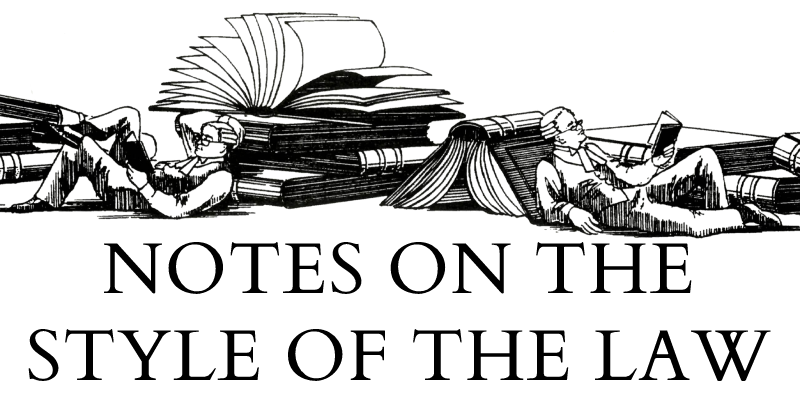

When my standing search for trite law, for publication on a popular micro-blogging service, At the time of writing, the service is currently known as ‘X’ and was formerly known as ‘Twitter’. It was a platform on which users can post short messages of up to 280 characters and was under the ownership of Mr Elon Musk, a billionaire entrepreneur and controversial public figure. It was disproportionately used by those in journalism and to a lesser extent in the law. For why it is necessary to explain the nature of such a service, see ‘Social Media in Court Judgments’, Note of 19 November 2022. as part of a complilation I maintain under the user-name ‘@TriteLawuk’, I came across Mellor J’s judgment in Lifestyle Equities CV v Royal County of Berkshire Polo Club Ltd. [2023] EWHC 2923, ChD (IP) The headnote and first paragraph tell us that this was a reserved, written judgment (not a transcribed extemporaneous one), based off a consequentials hearing to determine matters stemming from Mellor J’s judgment of 19 July, although His Lordship provides no citation for that judgment or other information as to where it may be found. After having to search it myself, I found that the earlier judgment was published as [2023] EWHC 1839 ChD (IP).
Reading the judgment, I was struck when, nineteen paragraphs in, I came across the following sentence:
It is true that the Claimants are very litigious, and that Mr Haddad appears to treat litigation as a central part of the Claimants’ commercial strategy. ibid, para 19
I had thought I had been reading carefully, but I had not the faintest idea who Mr Haddad was. Thinking the fault was in myself rather than in my judicial stars, I read back over the preceding paragraphs to see where Mr Haddad was introduced. To my great surprise, there was not a single word so much as introducing this Mr Haddad. I could presume from context that whoever he was, he held some rôle or function within the organisation of the claimants, but that did not tell me much. Was he the CEO, the general counsel, the chairman, a large shareholder? There was not the faintest clue.
Then, five paragraphs later, an ordered list contained the following:
iv) The evidence of Señor Garcia, in respect of which the Claimants appear to claim the whole of the costs incurred in preparing and conducting the cross-examination of Señor Garcia at trial, which, it is said, took the most time of any of the witnesses. ibid, para 24
Once again, I had not the faintest hint as to who this mysterious, perhaps Spanish, man was. There was not the slightest bit of information in Mellor J’s preceding paragraphs, nor indeed in any succeeding ones. Later we are told his evidence was related to the Latin American market, ibid, para 51 but the nature of Señor Garcia’s background and expertise is not at all addressed.
Then, twenty-three paragraphs on, more mysterious characters are introduced—names familiar to the reader only from being mentioned in the long list of additional parties to the case in the headnote. Who were this Mr and Mrs Morrison and what possible relationship do they have to things?
It is true that D1’s survival was dependent on the support from the late Mrs Morrison. However, my point was not so much financial but emotional. D1 was established and built up by the late Mr Morrison, so it was hardly likely that his widow and son (D2 & D3) would allow the club to go under. ibid, para 47
This very boring mystery story of a judgment highlights a bad practice seen in judicial writing. First, Mellor J failed to provide a citation to the original judgment to which this judgment is the consequential, which commits the grave sin of discourtesy to the reader. One should endeavour to provide one’s reader with proper citation to other relevant decisions, so as to ease the reader’s work. This is particularly acute because, in the absence of a citation, a reader may well wrongly assume that the judgment being referenced was unpublished and cannot be accessed.
However, even if His Lordship had given the correct citation to the earlier decision, it would still be improper to randomly throw in names without even so much as a sentence of introduction, as the case at bar does. The temptation to remove such context is probably grounded in three fallacious justifications: first, that readers can simply consult the main judgment for information; second, that such information is irrelevant to those reading this judgment; and third, that a consequentials judgment is of interest only to the parties who already know these things.
All three of these points are simply wrong. Let us start with the first —that readers may just consult the main judgment if they want context. This is an argument grounded in discourtesy and is making a demand of potentially enormous labour from the reader. The main judgment in the case at bar runs to 352 paragraphs and it is unfair as well as unrealistic to expect a reader to process all of that, when the author can simply include a pithy summary to introduce context in the consequential judgment. Moreover, a reader interested in a judgment dealing with (as the consequentials judgment at bar does) anti-suit injunctions and costs may have no interest in a judgment dealing with (as the main judgment does) the enforceability of a trademark. No humane author can insist that a reader go off and examine a longer judgment on some other area of law to know basic information. It is not enough to point out that the diligent reader can obtain such information. That is rather like a host pointing out that his guests need not starve—they can obtain food elsewhere. A good writer, like a good host to her guests, provides for her reader’s needs and ease.
The next objection is that this kind of stripped writing is economical and efficient and avoids unnecessary fat by limiting matters to the bare essentials of the case. Yet, the context at issue is not an optional extra, but is absolutely essential to understand why Mellor J ruled in a particular way on particular issues. In order to understand His Lordship’s view of a witness’s credibility and its impact on costs, we need to have a basic idea of how important or relevant that witness was. In turn, to know those points, we first need to know who the witness was. Law takes its meaning from context. The essence of our common law system of adjudication is that of seeing how the law interacts with, to quote Parke B, ‘new combinations of circumstances’. Mirehouse v Rennel (1833) 1 Cl & F 527, 546, Exch Then, in turn, we derive from the application in those combinations of circumstances a rule to apply to future such combinations. In the absence of detail as to the combination of circumstance, there is no way to understand the nature of the decision. Some basic context is essential whenever a court makes its ruling.
Finally, let us consider the claim that: this sort of consequentials judgment, this meddling with costs and injunctions, is of such narrow interest that only the parties, who know all the relevant matters, will bother reading it. This is, with respect to my imaginary interlocutor posing this argument, nonsense. The judge cannot predict to what uses future lawyers will put the case. Law’s brilliance at constant combinations of circumstances mean that the specialised intersection in a seemingly narrow case (such as of intellectual property and costs, or particular interpretations of witness credibility) may suddenly become relevant one day for reasons no one at the time can realise. Moreover, many lawyers specialise in costs law—indeed, one of the many legal professions of England & Wales is that of costs draughtsmen, dedicated solely to this question—and it thus makes little sense to claim this is some obscure area of little interest. Moreover, even in specialised cases, the demands of open justice require that the judge craft a judgment as accessible to the public reader as to any of the parties. To put out an inscrutable judgment and treat its publication as mere lip service, rather than to actually write in an open manner, is to insult the principle of open justice.
Diplock LJ (as he then was) famously said that ‘jurisdiction’ was a concept which ‘takes its colour from its context.’ Anisminic Ltd v Foreign Compensation Commission [1968] 2 QB 892, 889, CA The same may be said of the law generally, in which, to quote the Baroness Hale of Richmond, ‘context is everything.’ Stack v Dowden [2007] 2 AC 432, para 69, HL To exclude context is not merely to be discourteous to the reader, but to render a judgment incomplete as one link in the long chain of the common law. Legal writers—judges, academics, and practitioners alike—ought always to include the proper context.

© 2023; 2 Car III, Elijah Z Granet, but licensed to all under the terms of Creative Commons licence
CC-BY-SA 4.0
Published by

GRANET PRESS
LIMITED


Comments
Post a Comment
Contributions are always welcome!